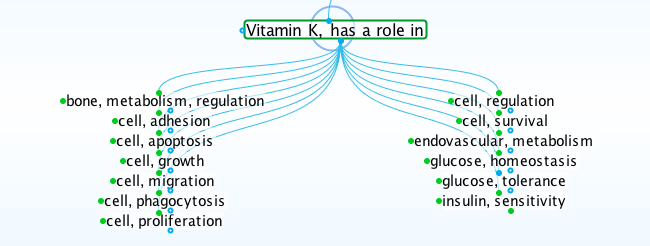Posted by Horton Tatarian, research biochemist, on 17th Jun 2016
Vitamin K, Bones, Arteries, and Longevity

Green leafy vegetables are rich in vitamin K 1 (phylloquinone).
Overview of Vitamin K
What Is Vitamin K?

Life Sciences Database Screenshot, What is vitamin K, Lifesciences.care
Plants produce vitamin K 1 (phylloquinone). Certain bacteria and body tissues convert vitamin K 1 into vitamin K 2 (menaquinone) as required for metabolism.
Well known for blood coagulation
The Danish word, koagulation, gave vitamin K its name. Vitamin K is an essential nutrient for coagulation.
Seven blood clotting factors require vitamin K for their function: factors VII, IX, and X; proteins C, S, and Z, and prothrombin (factor II). Bleeding occurs in overt states of vitamin K deficiency.

Life Sciences Database Screenshot, Vitamin K-dependent blood clotting factors, Lifesciences.care
Vital for bone and vascular health
Researchers also discovered that vitamin K serves as a coenzyme for glutamyl carboxylase, an enzyme that makes a protein (gamma-carboxyglutamate) that determines whether or not calcium deposits in bones or blood vessels.

Life Sciences Database Screenshot, What requires vitamin K, Lifesciences.care
Vitamin K inhibits bone resorption (loss of calcium and other minerals from bones) and ectopic calcification, which is the deposition of calcium in soft tissues including blood vessels.
In practice, the terms ectopic calcification and soft-tissue calcification (or deposition) are synonymous but lead to different articles in the research literature and our database.

Life Sciences Database Screenshot, Vitamin K suppresses, Lifesciences.care
Based on encouraging research findings, scientists and physicians use high doses of vitamin K to explore effects on strengthening bones and stopping vascular calcification.
We hypothesize that treatment with MK-7 will slow down or arrest the progression of [coronary artery calcification] and that this trial may lead to a treatment option for vascular calcification and subsequent [cardiovascular disease]. Reference
(Calcium deficiency is the other primary driver of bone loss, blood vessel calcification, and ectopic calcification in general. See Calcium, Health and Disease.)
Engaged in the function of all cells
Additional findings point to roles of vitamin K beyond blood coagulation and bone and vascular health. Vitamin K supports cell proliferation, growth, and other vital functions, which suggests its value in promoting longevity and optimal health throughout the body.

Life Sciences Database Screenshot, Vitamin K has a role in, Lifesciences.care
Fat-Soluble But Non-Toxic
Vitamin K is a fat-soluble vitamin, as are vitamins A, D, and E.
However, unlike A and D, which accumulate in the body and have toxic effects when consumed in excess, there is no known upper limit on safe intake for vitamin K. On the contrary, the maintenance of tissue vitamin K reserves requires regular consumption of adequate amounts of vitamin K.
In contrast to other fat-soluble vitamins, dietary vitamin K is rapidly lost to the body resulting in comparatively low tissue stores. Reference
A majority (approximately 60-70%) of the daily dietary intake of phylloquinone is lost to the body by excretion, which emphasizes the need for a continuous dietary supply to maintain tissue reserves. Reference
Vitamin K Deficiency
Overview
The statement headings in our database reflect (and link to) findings published in peer-reviewed scientific journals.

Life Sciences Database Screenshot, Vitamin K deficiency, Lifesciences.care
For brevity, the remainder of this article covers only the following statement headings.
- Vitamin K deficiency impairs
- Vitamin K deficiency has a role in causing
- Subclinical deficiency associates with
- What leads to vitamin K deficiency
- What supplies vitamin K
Vitamin K deficiency impairs
Vitamin K deficiency reduces blood coagulation, bone density, bone mineralization, and ectopic calcium removal. The reduction of bone mineralization causes the loss of bone density.
The removal of calcium from blood vessels and other soft tissues depends on calcium binding proteins that require vitamin K to function.

Life Sciences Database Screenshot, Vitamin K deficiency impairs, Lifesciences.care
The proteins that bind and control the placement of calcium and require vitamin K to function include GAS6 protein, Gla Rich Protein, Matrix Gla Protein, and Osteocalcin.
Vitamin K deficiency results in inadequate activation of [Matrix Gla Protein], which greatly impairs the process of calcium removal and increases the risk of calcification of the blood vessels. Reference

Vitamin K deficiency has a role in causing
A lack of vitamin K disables calcium binding proteins, allowing the formation of osteophytes such as bone spurs and vascular calcification (calcified arteries).
Osteopenia and osteoporosis are medical terms for mild and more severe degrees of loss of bone density.

Life Sciences Database Screenshot, Vitamin K deficiency has a role in causing, Lifesciences.care
Subclinical deficiency associates with
Calcium loss from the bones and deposition in arteries can occur when vitamin K intake is high enough to prevent bleeding but too low for bone and vascular health, a condition some professionals call subclinical vitamin K deficiency.
This study clearly shows that a diet low in vitamin K1 can result in a functional subclinical deficiency of vitamin K (decreased urinary gamma-carboxyglutamic acid excretion) without affecting blood coagulation. Reference
Reduced levels of gamma-carboxyglutamic acid in the urine in a person with adequate blood clotting ability suggests a "subclinical" deficiency of vitamin K.

Life Sciences Database Screenshot, Subclinical vitamin K deficiency associates with, Lifesciences.care
However, many scientists refuse to use the term "subclinical" when atherosclerosis, osteoarthritis, osteoporosis, or similar clinical findings occur in a person with decreased gamma-carboxyglutamic acid in the urine.
Concurrent arterial calcification and osteoporosis have been called the "calcification paradox" and occur frequently in postmenopausal women. The results of two dose-response studies have indicated that the amount of vitamin K needed for optimal gamma-carboxylation of osteocalcin is significantly higher than what is provided through diet alone and that current dosage recommendations should be increased to optimize bone mineralization. Reference
For more about the calcification paradox, see Calcium, Health, and Disease. Vitamin K deficiency and calcium deficiency usually occur together.
What leads to vitamin K deficiency
Whether "subclinical" or not, inadequate intake due to Western dietary habits is the leading cause of vitamin K deficiency.
Vitamin K, particularly as vitamin K2, is nearly nonexistent in junk food, with little being consumed even in a healthy Western diet. Reference
Also, the drug, warfarin (Coumadin®), prescribed to inhibit blood clotting, works by causing a deficiency of vitamin K.

Life Sciences Database Screenshot, What leads to vitamin K deficiency, Lifesciences.care
Assuring Vitamin K Sufficiency
Foods Rich in Vitamin K
Excellent food sources of vitamin K include algae (including seaweed), green leafy vegetables, green pepper, and the vitamin-K rich spices turmeric, curry (contains turmeric), and thyme.

Life Sciences Database Screenshot, What supplies vitamin K, Lifesciences.care
Green leafy vegetables with the highest content of vitamin K include arugula, endive, kale, leaf lettuce, parsley, spinach, swiss chard, turnip greens, and watercress.

Life Sciences Database Screenshot, Green leafy vegetable supplies vitamin K, Lifesciences.care
The USDA National Nutrient Database details the nutritional content of foods.
Dietary Supplements High in Vitamin K
Multiple vitamins and most dietary supplements of vitamin K contain only microgram amounts of vitamin K, which is only enough to prevent bleeding from vitamin K deficiency. Choose a vitamin K supplement that offers 1 to 5-milligram amounts of vitamin K and take one daily.
Related Product Category
Related Articles
Calcium, Health, and Disease
Magnesium, Health, and Disease
Eat Foods High In Electrons
About Horton Tatarian

I’m a biochemist who examines scientific findings on health and disease. My degree in biochemistry is from U.C. Berkeley. UCLA School of Medicine granted an M.D. degree in 1974. Since then, independent research prepared me to advise clients on natural ways of self-care.

